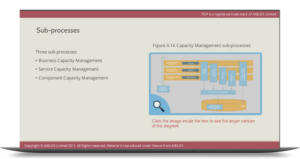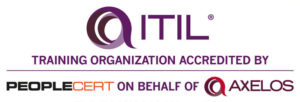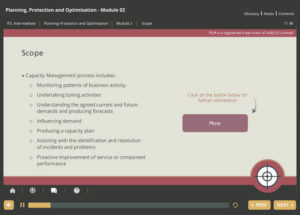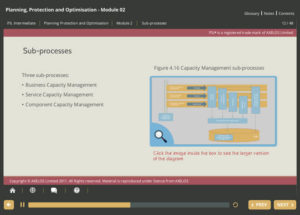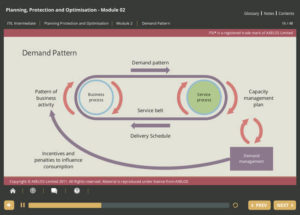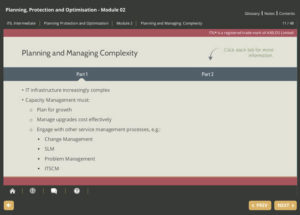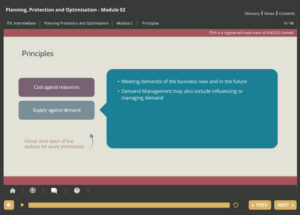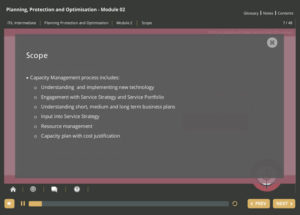E-learning ITIL® PLANNING, PPROTECTION & OPTIMIZATION (PPO)
Study for a qualification in ITIL Planning, Protection and Optimization (PPO) by taking an online training course from 4PA!
This course has been accredited by PeopleCert, who are licensed by AXELOS as an Examination Institute for an ITIL Planning, Protection & Optimization qualification in IT Service Management.
Why you Should Take This Course?
This course is designed to help you to prepare to take and pass the exam leading to the ITIL Intermediate Certificate in Planning, Protection and Optimization.
Success in the exam will also earn you 4 credits towards the 22 credits needed to gain the ITIL Expert qualification.
PPO is a collection of relevant practices from the core ITIL guidance that are related to service optimization, security and the related planning in support of this. It takes a detailed look at some of the processes described in Service Design and Service Strategy and examines each process in terms of the day-to-day operation of the ITIL process.
Browse the course syllabus for a full module by module breakdown of what’s included.
With this course, you’ll receive 6 months access from the date of purchase as well as a FREE exam voucher to use whenever you are ready to sit the exam!
This course will provide you with a good understanding of Planning, Protection and Optimization principles, its processes and other aspects within the capability stream.
The ITIL Planning, Protection and Optimization Certificate has become the IT industry’s de-facto intermediate professional qualification in the field of IT Service Management.
Why Study ITIL PPO with 4PA?
4PA is :
- A Leading Training & Consulting Organization
- Accredited by various principals
- World-wide presence and delivery models
- Unique, but proven,knowledge transfer and validation techniques
- Adds great value to the Organizations
- Result oriented approach
By taking this course, participants will benefit from learning the following :
Availability Management – Ensuring that all IT infrastructure, processes, tools, roles, etc. are appropriate for the agreed availability targets
Capacity Management – Ensuring capacity of IT services and the IT infrastructure is able to deliver the agreed service level targets in a cost effective and timely manner
Information Security Management – Ensuring the confidentiality, integrity and availability of an organisation’s information, data and IT services
IT Service Continuity Management – Ensuring that the IT service provider can always provide minimum agreed Service Levels, by reducing the risk from disaster events to an acceptable level and planning for the recovery of IT services
Demand Management – Ensuring that the service provider has sufficient capacity to meet the required demand
The Benefits of eLearning:
All 4PA courses run entirely over the web and have been carefully designed to provide the most comprehensive, interactive and flexible learning experience available. Study when it suits you – at home, at work or on the move.
Flexibility to learn from your desktop, laptop or tablet at your own pace, when it suits YOU. Anytime. Anywhere (an internet connection is required).
Our courses are easy-to-use. Participants will benefit from an interactive multimedia environment that enhances the way you study.
With eLearning, individuals and organizations avoid the typical costs of travel and consultancy by studying independently online.
Our online training courses are designed with mobility and accessibility in mind. You can access your training from any desktop computer, laptop, tablet, or mobile phone.
This eLearning course contains all the learning materials you need in order to prepare for the ITIL Planning, Protection & Optimization.
Our course has been accredited by PeopleCert, who are licensed by AXELOS as an Examination Institute for the ITIL® Planning, Protection & Optimization Certificate in IT Service Management.
The official mock exams are provided and the course includes a module on how to approach these, working through some examples.
In addition to the resources provided, the examination guidance recommends that candidates should complete at least 30 hours and 30 minutes of personal study.
Full Details of our ITIL PPO Course:
Each of the syllabus areas will be covered in a module of the course; each module may contain a number of lessons, dependent on the areas covered.
Browse the contents of this eLearning course by clicking on a module title below that you would like to know more about. Why not try a free trial module of our course before you buy!
Module 1: Introduction to Planning, Protection and Optimization
This module provides an introduction to the core concepts and terminology used in the lifecycle stages that are related to PPO.
The candidate must be able to understand and describe:
Purpose and objectives and value of Service Design
The lifecycle in context
Service Design basics
The interfaces of design coordination with other processes related to PPOModule 2: Capacity Management
This module covers how the process of Capacity management contributes to PPO practices. The lifecycle phase emphasized in this module is service design.
A complete overview of the objectives, scope and importance of capacity management as a process to generate business value are explored. Capacity management policies, principles, concepts, design, activities, methods and techniques are explained in relationship to PPO practices.
Efficient use of Capacity management metrics are reviewed in this module. To meet the learning outcomes and examination level of difficulty
The candidate must be able to understand and describe:
The purpose and objectives of the Capacity management process
The scope of the Capacity management process
The importance of capacity management as a process to generate business value
The policies, principles and basic concepts of Capacity management
The main activities, methods and techniques that enable capacity management, and how they relate to planning, protection and optimization
The triggers, inputs, outputs and interfaces of capacity management and its interfaces with other processes
The capacity management information system and its role in information management
How the critical success factors and key performance indicators can be used to demonstrate the efficiency and effectiveness of successful capacity management
Challenges and risks of capacity managementModule 3: Availability Management
This module covers the purpose, objectives and scope of Availability Management and its importance as a process to generate business value.
It also covers the main activities, methods and techniques that enable Availability Management and how they relate to planning, protection and optimization.
To meet the learning outcomes and examination level of difficulty, the candidates must be able to understand, describe, identify, demonstrate, apply, distinguish, produce, decide or analyze:
The purpose and objectives of the availability management process
The scope of the availability management process
The importance of availability management as a process to generate business value
The policies, principles and all basic concepts of availability management
The main activities, methods and techniques that enable availability management and how they relate to planning, protection and optimization
The triggers, inputs, outputs and interfaces of availability management, and its interface with other processes
How availability management relates to information management
How critical success factors and key performance indicators can be used to demonstrate the effectiveness and efficiency of the availability management process
The challenges and risks associated with the availability management processModule 4: IT Service Continuity Management
This module looks at the basic concepts and principles relating to IT Service Continuity Management.
A complete overview of the objectives, scope and importance of ITSCM as a process to generate business value are explored.
ITSCM policies, principles, concepts, activities, methods and techniques are explained in relationship to PPO practices through each of the four stages of the ITSCM lifecycle Efficient use of ITSCM metrics are reviewed in this module.
To meet the learning outcomes and examination level of difficulty, the candidates must be able to understand, describe, identify, demonstrate, apply, distinguish, produce, decide or analyze:
The purpose and objectives of the ITSCM process
The scope of the ITSCM process
The importance of ITSCM as a process to generate business value The policies, principles and basic concepts of ITSCM
The process activities, methods and techniques and how they relate to planning, protection and optimization, particularly stages 1-4 of the ITSCM lifecycle
Invocation of ITSCM
The triggers, inputs and outputs and interfaces of ITSCM and its interface with other processes
Information management for the ITSCM process
How critical success factors and key performance indicators can be used and applied to demonstrate effectiveness and efficiency of successful ITSCM
The challenges and risks associated with the ITSCM processModule 5: Information Security Management
The module looks at the process of Information Security Management contributes to PPO practices.
A complete overview of the objectives, scope and importance of Information Security Management as a process to generate business value are explored. Information Security Management policies, principles, concepts, activities, methods and techniques are explained in relationship to PPO practices Efficient use of Information Security Management metrics are reviewed in this module.
The candidate must be able to understand and describe:
The purpose and objectives of the Information Security Management process
The scope of the Information Security Management process
The importance of information security management as a process to generate business value
The policies and principles and basic concepts of Information Security Management
The main activities, methods and techniques that enable this process and how they relate to planning, protection and optimization
The triggers, inputs and outputs, and interfaces of information security management
Information security management and the security management information system
How critical success factors and key performance indicators can be used and applied to demonstrate effectiveness and efficiency of successful Information Security Management process
The challenges and risks associated with the Information Security Management processModule 6: Demand Management
This module looks at the basic concepts and principles relating to Demand Management and the activities for the process and the triggers, inputs and outputs of the process.
A complete overview of the objectives, scope and importance of Demand Management as a process as well as of what activity based demand management and business activity patterns are. Demand Management policies, principles, concepts, activities, methods and techniques are explained in relationship to PPO practices.
Managing demand for service is explored, as well as how it interfaces to service design.
The candidate must be able to understand and describe:
The purpose and objectives of the Demand Management process
The scope of the Demand Management process
The value to business lifecycle
The policies and principles and basic concepts of demand management The process activities, methods and techniques of demand management
The triggers, inputs and outputs, and interfaces
Information management and Demand Management
Critical success factors and key performance indicators
The challenges and risks associated with the demand management processModule 7: PPO Roles and Responsibilities
This module covers the generic roles of Process Manager and Process Practitioner and the key roles/functions of Capacity Management Process Manager and Availability Management Process Manager.
It also covers the key roles/functions of the Service Continuity Management Process Manager and the Information Security Management Process Manager.
The candidate must be able to understand, describe ,identify, demonstrate, apply, distinguish, produce, decide or analyze the key roles/functions responsible for executing each process step as related to:
Process manager
Process practitioner
Capacity management process manager
Availability management process manager
IT service continuity management process manager
Information security management process manager demand management rolesModule 8: Technology and Implementation Considerations
This module covers the generic requirements for technology to assist Service Design, the evaluation criteria for technology and tooling for process implementation and the good practices for practice and process implementation.
It also covers the challenges, Critical Success Factors and risks related to implementing practices and processes, how to plan and implement Service Management technologies and the consideration for implementing technologies in supporting the processes within planning, protection and optimization practice, in particular, designing technology architectures.
The candidate must be able to understand and describe:
The generic requirements for technology to assist service design
The evaluation criteria for technology and tooling for process implementation
The good practices for practice and process implementation
The challenges, critical success factors and risks related to implementing practices and processes
How to plan and implement service management technologies
The consideration for implementing technologies in supporting the processes within planning, protection and optimization practice, in particular, designing technology architectureModule 9: Exam Preparation
This module prepares you for the ITIL Planning, Protection and Optimization examination.
Thinking of sitting the ITIL Planning, Protection & Optimization Exam? On this page, you will find everything you need to know!
In order to achieve this ITIL Intermediate qualification, you must pass the ITIL® Planning, Protection and Optimization Certificate in IT Service Management exam.
You can take the exam online (virtually) using a service provided by PeopleCert.
What you Need to Know About the Exam:
The examination will consist of a complex multiple choice, scenario-based closed book paper of 8 questions, to be answered within 90 minutes.
To pass the exam you must get 28 out of 40 questions correct, or 70% and If successful, delegates will gain 4 credits towards ITIL Expert level.
The course materials provided in the Planning, Protection and Optimization eLearning course will provide you with all the information you need for this exam. You will be tested on:
Exam Duration: Maximum 90 minutes for all candidates in their respective language (Candidates sitting the examination in a language other than their first language have a maximum of 120 minutes and are allowed to use a dictionary).
Before you book you can test that your computer configuration will meet the requirements for a PeopleCert exam, using this online test.
This test focuses on the suitability of your webcam, microphone and internet connection. Please Visit the PeopleCertwebsite for a complete list of information and guidance.
You will be Tested on:
Introduction to Planning, Protection and Optimization
Capacity Management
Availability Management
IT Service Continuity Management
Information Security Management
Demand Management
PPO Roles and Responsibilities
Technology and Implementation Considerations
Exam Preparation
Why not try out a free trial module from our ITIL Planning, Protection and Optimization eLearning course!
This ITIL Intermediate trial module will provide you with an introduction to PPO and includes the basic purpose and objective from service design and service strategy in support of PPO within a lifecycle context.
Try the Course Before you Buy!
Like the full ITIL Planning, Protection & Optimization (PPO) eLearning course, you can access this free trial module from any device whether you are at home, at work, or on the move!
Our course has been fully accredited by PeopleCert, who are licensed by AXELOS as an Examination Institute for IT Service Management.
If you require any other information regarding the course or how to access the e-learning on a mobile device, please feel free to leave your details with us via our online contact form and a member of our team will be in touch.
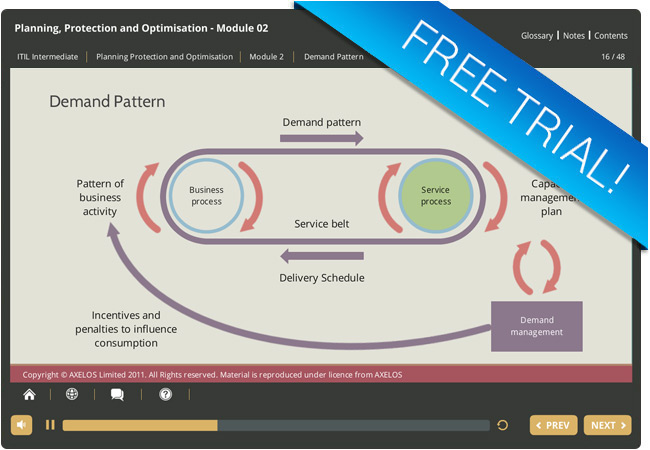
ITIL® and the The Swirl Logo™ are registered trade marks of AXELOS Ltd. Used and reporodued with the permission of AXELOS.


